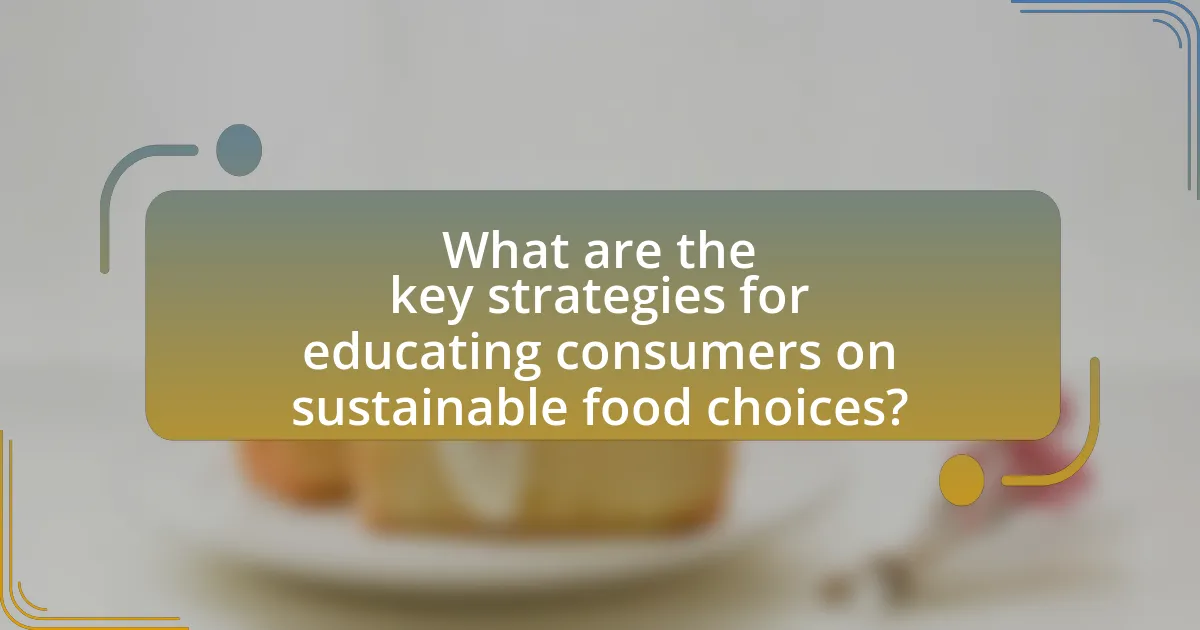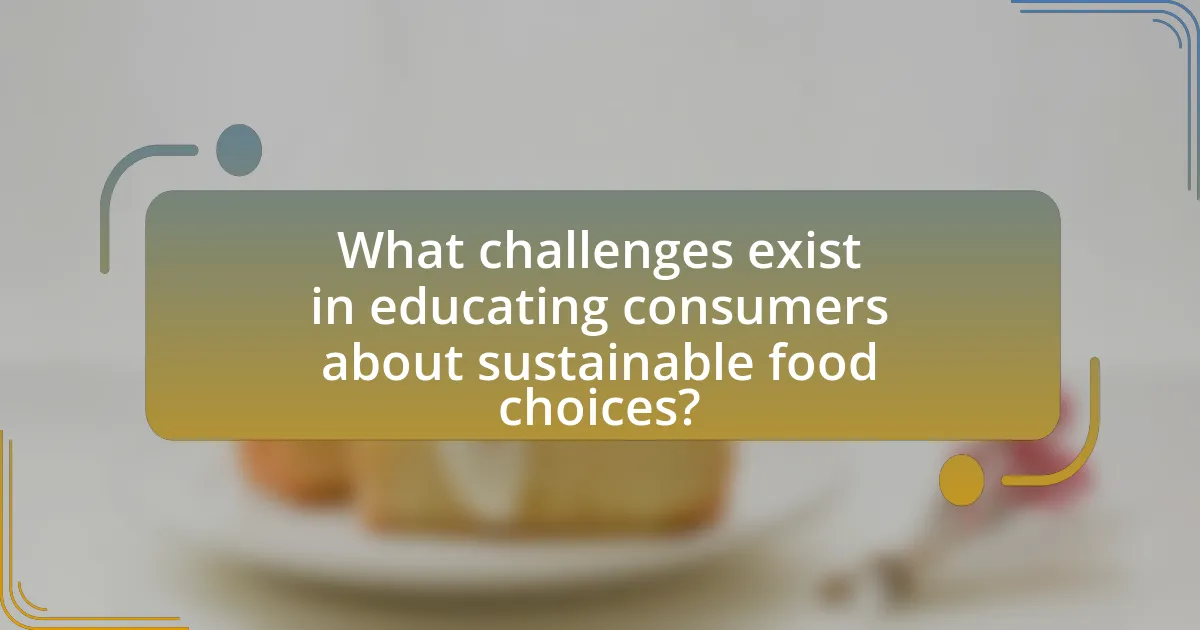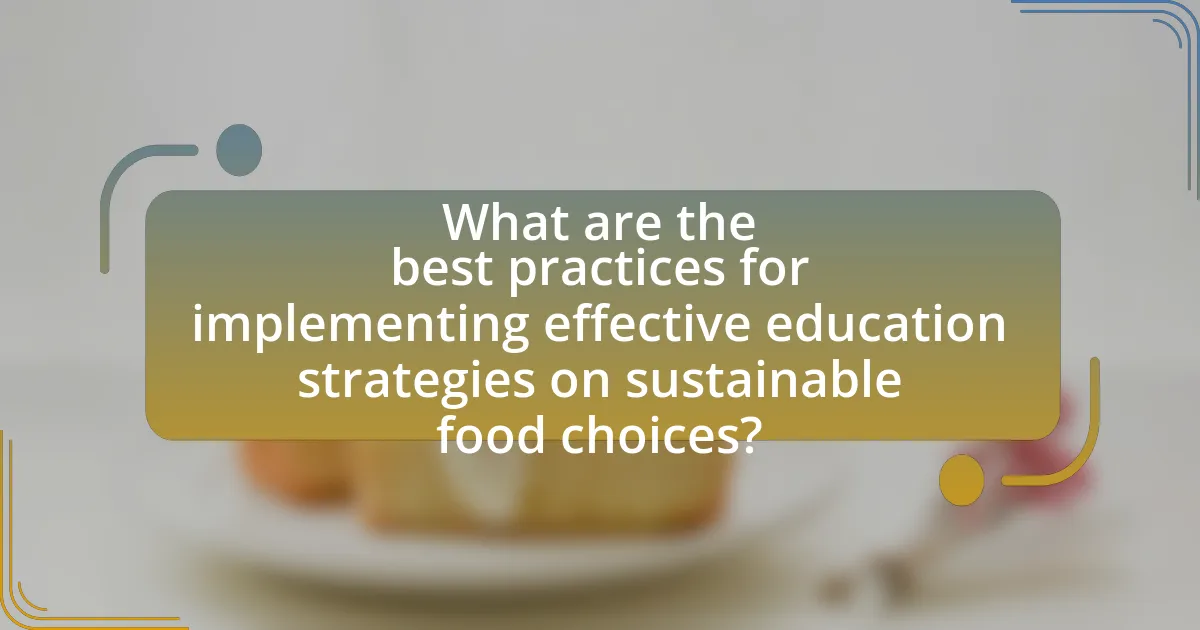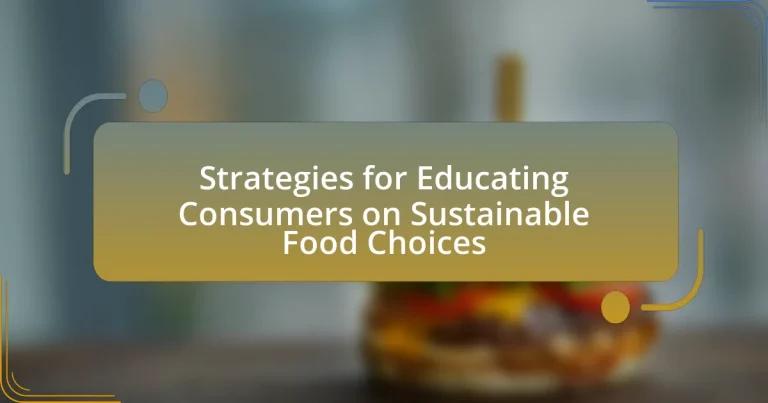The article focuses on strategies for educating consumers about sustainable food choices, emphasizing the importance of clear information regarding the environmental impact of food production and the promotion of local and seasonal foods. It outlines effective methods for raising awareness, such as targeted educational campaigns, social media engagement, and interactive workshops. The article also discusses the role of community involvement, the challenges posed by misinformation, and the necessity of tailoring educational approaches to different demographics. Additionally, it highlights practical tips for consumers to adopt sustainable eating habits and the resources available for learning about sustainable food options.

What are the key strategies for educating consumers on sustainable food choices?
Key strategies for educating consumers on sustainable food choices include providing clear information about the environmental impact of food production, promoting local and seasonal foods, and utilizing effective communication channels such as social media and community workshops. Research indicates that consumers are more likely to make sustainable choices when they understand the benefits, such as reduced carbon footprints and support for local economies. For instance, a study published in the Journal of Consumer Research found that consumers who received information about the sustainability of their food choices were more inclined to purchase eco-friendly products.
How can awareness be raised about sustainable food options?
Awareness about sustainable food options can be raised through targeted educational campaigns that utilize social media, community workshops, and partnerships with local organizations. These campaigns can effectively inform consumers about the environmental and health benefits of sustainable food choices, as evidenced by studies showing that individuals exposed to educational materials are more likely to change their purchasing behaviors. For instance, a report by the Food and Agriculture Organization highlights that educational initiatives can increase consumer knowledge and lead to a 20% increase in the purchase of sustainable products.
What role do educational campaigns play in promoting sustainable food choices?
Educational campaigns play a crucial role in promoting sustainable food choices by raising awareness and providing information about the environmental and health impacts of food consumption. These campaigns educate consumers on the benefits of choosing local, organic, and plant-based foods, which can reduce carbon footprints and support biodiversity. For instance, a study published in the Journal of Environmental Psychology found that individuals exposed to educational materials about sustainable eating were 30% more likely to adopt eco-friendly dietary practices. This demonstrates that targeted educational efforts can effectively influence consumer behavior towards more sustainable food options.
How can social media be utilized to spread knowledge about sustainable eating?
Social media can be utilized to spread knowledge about sustainable eating by creating engaging content that informs users about the benefits and practices of sustainable food choices. Platforms like Instagram and Facebook allow for visually appealing posts, infographics, and videos that can effectively communicate information about local sourcing, seasonal eating, and plant-based diets. Research indicates that social media campaigns can increase awareness and influence dietary behaviors; for instance, a study published in the Journal of Nutrition Education and Behavior found that social media interventions significantly improved participants’ knowledge and attitudes towards healthy eating. By leveraging hashtags, challenges, and community engagement, social media can foster a culture of sustainability and encourage individuals to adopt more environmentally friendly eating habits.
What methods can be employed to engage consumers in sustainable food practices?
To engage consumers in sustainable food practices, methods such as educational campaigns, community-supported agriculture (CSA), and interactive digital platforms can be employed. Educational campaigns raise awareness about the environmental impact of food choices, utilizing statistics that show, for example, that livestock production contributes to 14.5% of global greenhouse gas emissions. Community-supported agriculture connects consumers directly with local farmers, promoting seasonal eating and reducing carbon footprints associated with transportation. Interactive digital platforms, including apps and social media, facilitate sharing of sustainable recipes and tips, fostering a community around sustainable eating habits. These methods collectively enhance consumer knowledge and encourage participation in sustainable food practices.
How can interactive workshops enhance consumer understanding of sustainability?
Interactive workshops enhance consumer understanding of sustainability by providing hands-on experiences that engage participants in practical applications of sustainable practices. These workshops facilitate active learning through activities such as group discussions, demonstrations, and real-life scenarios, which help consumers grasp complex sustainability concepts more effectively. Research indicates that experiential learning increases retention and comprehension; for instance, a study published in the Journal of Environmental Education found that participants in interactive workshops showed a 30% increase in knowledge retention compared to traditional lecture-based formats. This approach not only informs consumers about sustainable food choices but also empowers them to make informed decisions in their daily lives.
What impact do cooking classes have on consumer behavior regarding sustainable foods?
Cooking classes significantly influence consumer behavior towards sustainable foods by enhancing knowledge and skills related to sustainable cooking practices. Participants in these classes often develop a deeper understanding of the environmental and health benefits associated with sustainable food choices, leading to increased consumption of local, organic, and seasonal ingredients. Research indicates that individuals who engage in cooking classes are more likely to adopt sustainable eating habits, as evidenced by a study published in the Journal of Nutrition Education and Behavior, which found that cooking education improved participants’ attitudes towards healthy and sustainable food options. This shift in behavior is attributed to hands-on experience and the ability to connect with food sources, ultimately fostering a commitment to sustainability in their dietary choices.
Why is it important to tailor education strategies to different demographics?
Tailoring education strategies to different demographics is crucial because it ensures that the content is relevant and accessible to diverse groups. Different demographics, such as age, cultural background, and socioeconomic status, have varying levels of knowledge, interests, and barriers to understanding sustainable food choices. For instance, research shows that younger consumers may prioritize environmental impact, while older consumers might focus on health benefits. By customizing educational approaches, such as using relatable examples or culturally relevant materials, educators can enhance engagement and retention of information, leading to more informed decision-making regarding sustainable food choices. This targeted approach is supported by studies indicating that personalized learning increases effectiveness, as seen in the work of the National Center for Education Statistics, which highlights the positive correlation between tailored educational interventions and improved learning outcomes across diverse populations.
How do cultural differences influence perceptions of sustainable food choices?
Cultural differences significantly influence perceptions of sustainable food choices by shaping values, beliefs, and practices related to food consumption. For instance, in collectivist cultures, sustainability may be viewed through the lens of community well-being and environmental stewardship, leading to a preference for locally sourced foods that support local economies. Conversely, in individualistic cultures, sustainable food choices may be driven by personal health benefits or ethical considerations, such as animal welfare. Research indicates that cultural norms and traditions can dictate dietary preferences and the acceptance of sustainable practices; for example, a study published in the Journal of Consumer Research by authors Grunert and Juhl (2018) found that cultural identity strongly affects consumers’ willingness to adopt sustainable food practices. Thus, understanding these cultural nuances is essential for effectively educating consumers about sustainable food choices.
What age groups require different educational approaches for sustainability?
Different age groups require tailored educational approaches for sustainability, specifically children, adolescents, adults, and seniors. Children benefit from interactive and play-based learning that introduces basic concepts of sustainability, such as recycling and conservation. Adolescents require more in-depth discussions and critical thinking exercises that connect sustainability to social issues and personal responsibility. Adults often respond well to practical applications and community engagement, focusing on sustainable practices in daily life, such as food choices and energy use. Seniors may need approaches that emphasize the health benefits of sustainability and the preservation of resources for future generations, often through storytelling and community involvement. These differentiated strategies are supported by educational research indicating that age-appropriate methods enhance understanding and engagement in sustainability topics.

What challenges exist in educating consumers about sustainable food choices?
Educating consumers about sustainable food choices faces several challenges, primarily due to misinformation and lack of awareness. Misinformation can stem from conflicting messages in media and marketing, leading consumers to be confused about what constitutes sustainable practices. Additionally, many consumers lack awareness of the environmental impacts of their food choices, as studies indicate that only 30% of individuals understand the concept of sustainability in food production. Economic factors also play a significant role; sustainable options often come at a higher price, deterring budget-conscious consumers. Furthermore, accessibility to sustainable food sources can be limited in certain regions, making it difficult for consumers to make informed choices. These challenges highlight the need for targeted educational strategies to effectively inform consumers about sustainable food practices.
How do misinformation and myths affect consumer understanding of sustainability?
Misinformation and myths significantly distort consumer understanding of sustainability by creating confusion and fostering misconceptions about sustainable practices. For instance, widespread myths such as the belief that all organic products are inherently sustainable can lead consumers to make uninformed choices, ignoring other critical factors like carbon footprint and resource use. Research from the Food and Agriculture Organization indicates that misinformation can result in consumers prioritizing less sustainable options, ultimately undermining efforts to promote environmentally friendly practices. This misalignment between consumer perception and actual sustainability principles hampers effective decision-making in food choices.
What common misconceptions about sustainable food need to be addressed?
Common misconceptions about sustainable food include the belief that it is always more expensive, that all organic food is sustainable, and that local food is inherently better for the environment. The perception that sustainable food costs significantly more is misleading; while some sustainable options may be pricier, many affordable choices exist, and the long-term environmental benefits can outweigh initial costs. Additionally, not all organic products are produced sustainably, as organic farming can still involve practices harmful to ecosystems. Lastly, while local food can reduce transportation emissions, it is not always the most sustainable option, as factors like production methods and seasonal availability also play crucial roles in determining environmental impact.
How can credible sources be identified to combat misinformation?
Credible sources can be identified to combat misinformation by evaluating their authority, accuracy, objectivity, and currency. Authority refers to the qualifications and expertise of the author or organization, such as academic credentials or institutional affiliation. Accuracy involves checking the information against reliable references and ensuring it is supported by evidence, such as peer-reviewed studies or official statistics. Objectivity assesses whether the source presents information fairly without bias, often indicated by the presence of citations and a balanced viewpoint. Currency ensures that the information is up-to-date, particularly in rapidly changing fields like sustainable food choices. For example, research published in reputable journals, such as the Journal of Sustainable Agriculture, provides validated information that can effectively counter misinformation.
What barriers do consumers face in adopting sustainable food practices?
Consumers face several barriers in adopting sustainable food practices, including higher costs, limited availability, and lack of knowledge. Higher costs deter many consumers, as sustainable food options often come at a premium compared to conventional products. Limited availability in local markets restricts access to sustainable choices, particularly in food deserts. Additionally, a lack of knowledge about the benefits and methods of sustainable eating prevents consumers from making informed decisions. Research by the Food and Agriculture Organization indicates that these barriers significantly impact consumer behavior and choices regarding sustainable food.
How does cost influence consumer choices regarding sustainable foods?
Cost significantly influences consumer choices regarding sustainable foods, as higher prices often deter consumers from purchasing these products. Research indicates that price sensitivity is a major factor in food purchasing decisions, with studies showing that consumers are less likely to buy sustainable options when they are priced higher than conventional alternatives. For instance, a survey by the Food Marketing Institute found that 70% of consumers consider price as a primary factor when selecting food products, which directly impacts their willingness to choose sustainable foods that may carry a premium price tag.
What role does accessibility play in sustainable food education?
Accessibility is crucial in sustainable food education as it ensures that diverse populations can obtain knowledge and resources related to sustainable food practices. When educational materials and programs are designed to be inclusive, they empower individuals from various socioeconomic backgrounds to make informed food choices. Research indicates that communities with greater access to sustainable food education report higher engagement in sustainable practices, such as local sourcing and organic consumption. For instance, a study by the Food and Agriculture Organization highlights that accessible education initiatives can lead to a 30% increase in sustainable food purchasing behaviors among low-income households. This demonstrates that accessibility not only facilitates learning but also drives actionable change in food consumption patterns.
How can partnerships enhance the effectiveness of educational strategies?
Partnerships can enhance the effectiveness of educational strategies by leveraging diverse expertise and resources to create comprehensive learning experiences. Collaborations between educational institutions, non-profits, and businesses can provide access to a wider range of knowledge, tools, and networks, which can improve the quality and reach of educational initiatives. For instance, a partnership between a university and a local sustainable food organization can facilitate hands-on workshops that engage consumers directly, leading to better understanding and retention of sustainable practices. Research indicates that collaborative approaches in education can increase engagement and motivation among learners, as evidenced by a study published in the Journal of Educational Psychology, which found that students involved in community partnerships showed a 30% increase in knowledge retention compared to traditional methods.
What organizations can collaborate to promote sustainable food education?
Organizations that can collaborate to promote sustainable food education include non-profit organizations, educational institutions, government agencies, and private sector companies. Non-profits like the World Wildlife Fund and FoodCorps focus on sustainability and education initiatives, while universities often conduct research and outreach programs related to sustainable agriculture. Government agencies such as the USDA provide resources and guidelines for sustainable practices. Additionally, private companies in the food industry can partner with these organizations to create educational campaigns that raise awareness about sustainable food choices. Collaborations among these entities can leverage their unique strengths to effectively educate consumers on sustainable food practices.
How can local businesses support educational initiatives on sustainability?
Local businesses can support educational initiatives on sustainability by partnering with schools and community organizations to provide resources and expertise. For instance, businesses can sponsor workshops or seminars that focus on sustainable practices, such as local sourcing and waste reduction. Research indicates that community engagement in sustainability education can lead to increased awareness and behavioral changes among consumers, as seen in programs like the “Sustainable Food Systems” initiative by the University of California, which demonstrated improved consumer knowledge and practices. By actively participating in these educational efforts, local businesses not only enhance their community’s understanding of sustainability but also foster a customer base that values environmentally responsible choices.

What are the best practices for implementing effective education strategies on sustainable food choices?
The best practices for implementing effective education strategies on sustainable food choices include integrating hands-on learning experiences, utilizing clear and relatable messaging, and fostering community engagement. Hands-on learning, such as cooking classes or farm visits, allows individuals to directly experience sustainable practices, which can enhance understanding and retention. Clear messaging that simplifies complex concepts about sustainability helps consumers make informed choices; for example, using visuals and straightforward language can clarify the benefits of local and seasonal foods. Community engagement, through workshops and local events, builds a supportive network that encourages sustainable behaviors. Research indicates that community-based social marketing can significantly influence food choices by addressing barriers and promoting positive behaviors (McKenzie-Mohr, 2011).
How can feedback be used to improve educational programs on sustainability?
Feedback can be used to improve educational programs on sustainability by systematically gathering insights from participants to identify strengths and weaknesses in the curriculum. This process allows educators to adjust content, teaching methods, and engagement strategies based on real-time evaluations from learners. For instance, studies have shown that programs incorporating participant feedback can enhance understanding and retention of sustainability concepts by up to 30%, as evidenced by research conducted by the National Center for Sustainability Education. By analyzing feedback, educators can tailor their approaches to better meet the needs of diverse audiences, ensuring that the educational programs effectively promote sustainable food choices.
What methods can be employed to gather consumer feedback effectively?
Surveys and questionnaires are effective methods to gather consumer feedback. These tools allow businesses to collect quantitative and qualitative data directly from consumers regarding their preferences, experiences, and opinions. According to a study by SurveyMonkey, 70% of consumers prefer to provide feedback through online surveys, highlighting their convenience and accessibility. Additionally, focus groups can provide in-depth insights by facilitating discussions among selected consumers, allowing for a deeper understanding of their motivations and attitudes. Utilizing social media platforms for feedback also proves effective, as 54% of consumers express a willingness to share their opinions on these channels, according to a report by Sprout Social.
How can feedback be integrated into future educational strategies?
Feedback can be integrated into future educational strategies by systematically collecting and analyzing responses from participants to refine content and delivery methods. This approach allows educators to identify gaps in understanding and adjust materials accordingly, ensuring that the educational strategies remain relevant and effective. For instance, studies have shown that incorporating learner feedback can enhance engagement and retention rates, as evidenced by a 2019 research conducted by Hattie and Timperley, which found that feedback significantly improves learning outcomes when used to inform instructional practices.
What role does community involvement play in promoting sustainable food education?
Community involvement is crucial in promoting sustainable food education as it fosters collaboration, knowledge sharing, and local engagement. When communities participate in educational initiatives, they create a supportive environment that encourages individuals to adopt sustainable practices. For instance, community gardens and local workshops not only provide hands-on learning experiences but also strengthen social ties, making sustainable food choices more accessible and appealing. Research indicates that community-based programs can increase awareness and understanding of sustainable food systems, leading to higher participation rates in sustainable practices.
How can local events foster a sense of community around sustainable eating?
Local events can foster a sense of community around sustainable eating by providing opportunities for individuals to engage directly with local food producers and learn about sustainable practices. These events, such as farmers’ markets, community potlucks, and cooking workshops, create a platform for sharing knowledge and experiences related to sustainable food choices. For instance, a study by the American Journal of Public Health found that community-based food events significantly increase awareness and consumption of locally sourced foods, thereby strengthening community ties and promoting sustainable eating habits. By participating in these gatherings, individuals not only gain access to fresh, sustainable food options but also build relationships with like-minded community members, enhancing social cohesion and collective commitment to sustainable practices.
What initiatives can encourage community participation in sustainability education?
Community gardens are an effective initiative that can encourage participation in sustainability education. These gardens provide hands-on learning experiences about sustainable practices, such as organic farming and biodiversity. Research indicates that community gardens can enhance knowledge and awareness of sustainable food systems, as evidenced by a study published in the Journal of Community Health, which found that participants reported increased understanding of nutrition and environmental impact after engaging in community gardening activities. Additionally, workshops and events held in these gardens can further educate community members on sustainable food choices, fostering a sense of community and shared responsibility for environmental stewardship.
What practical tips can consumers follow to make sustainable food choices?
Consumers can make sustainable food choices by prioritizing local and seasonal produce, which reduces transportation emissions and supports local economies. Choosing organic products also contributes to sustainability, as organic farming practices often promote biodiversity and soil health. Additionally, reducing meat consumption can significantly lower one’s carbon footprint; studies indicate that livestock production is responsible for approximately 14.5% of global greenhouse gas emissions. Lastly, minimizing food waste by planning meals and using leftovers effectively can further enhance sustainability, as wasted food contributes to unnecessary resource consumption and methane emissions in landfills.
How can meal planning contribute to sustainable eating habits?
Meal planning can significantly contribute to sustainable eating habits by reducing food waste and promoting the consumption of seasonal, local ingredients. When individuals plan their meals, they are more likely to purchase only the necessary ingredients, which minimizes excess food that may go uneaten. According to the Food and Agriculture Organization, approximately one-third of all food produced globally is wasted, highlighting the importance of strategies like meal planning to combat this issue. Additionally, meal planning encourages the selection of seasonal and local produce, which typically requires fewer resources for transportation and storage, thereby lowering the carbon footprint associated with food consumption. This approach not only supports local economies but also fosters a more environmentally friendly diet.
What resources are available for consumers to learn about sustainable food options?
Consumers can learn about sustainable food options through various resources, including government websites, educational organizations, and mobile applications. For instance, the USDA provides guidelines and information on sustainable agriculture practices, while organizations like the World Wildlife Fund offer resources on sustainable seafood and farming practices. Additionally, apps such as “Good Food on a Tight Budget” help consumers make informed choices about sustainable food within their budget. These resources are designed to educate consumers on the environmental impact of their food choices and promote healthier, sustainable eating habits.


